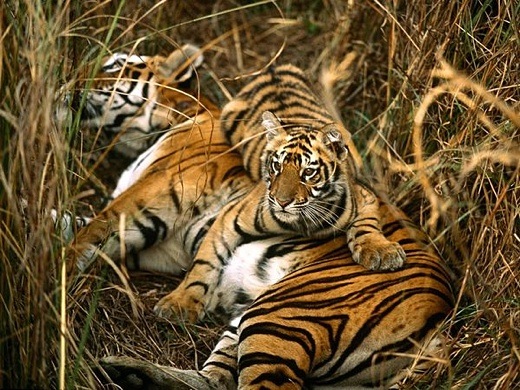 Image above: A Bengal tiger and her cub rest in tall grass. From (http://animals.nationalgeographic.com/animals/mammals/bengal-tiger/).
Image above: A Bengal tiger and her cub rest in tall grass. From (http://animals.nationalgeographic.com/animals/mammals/bengal-tiger/).
It's no secret that most human-animal conflicts don't end well for wildlife -- but in a rare show of interspecies hospitality, an entire community in India has decided to relocate in order to make room for big cats in need of some extra space. Last week, all 350 residents of Umri, a village in an important wildlife preserve in the northern region of Sariska, packed up their things and moved to a new, less ecologically sensitive locale nearby, and all for the sake of securing a bit of space for a rapidly dwindling tiger population.
Over the course of a century of encroaching development in India, the nation's once thriving tigers numbers have been reduced by over 98 percent. In recent decades, the establishment of protected zones, like the Sariska Tiger Reserve, have enabled the species to avoid extinction for now. The tiger's long-term survival, however, may depend on a reversal of trends -- by letting the wilderness reclaim some of the land it lost to humans.
According to the BBC, Umri is actually the second village to relocate entirely on account of helping tigers. And, in the coming years, four other communities are likely to follow, but they aren't without incentive.
The villagers are compensated with land, cash and livestock worth up to 1 million rupees ($20,000) and relocated to the nearest cultivable plots outside the reserve, Rajasthan's chief wildlife warden AC Chaubey told the BBC.
No matter the cost, conservationists believe that relocating villages in the tiger's habitat could help bolster their numbers -- and the help is much needed. From an estimated population of 100,000 at the turn of last century, a 2011 census reveals that a mere 1,700 are still exist in the wilds of India.
.
No comments :
Post a Comment